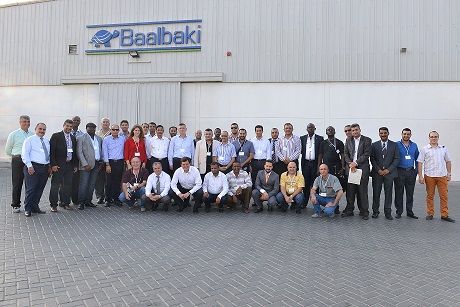It is an undeniable fact that entrepreneurship and innovation run deep in the blood of the Baalbaki family.
For more than a hundred years, each Baalbaki generation had shown remarkable instincts when it came to local but also to international market opportunities. The Baalbaki Group itself was established in 1957, and today employs over 500 employees across the Middle East in its industry, trade, real estate, investment, and agriculture activities with headquarters in Lebanon.
History of the Baalbaki family
It is over a century ago that the Baalbaki family started building up its business reputation. Izzo Baalbaki is at the origin of the family’s history: in the mid-1870’s he established a textiles manufacturing plant in Syria. After Izzo’s death in 1907, his eldest son Sobhi took over the business. Sobhi’s three younger brothers Rushdi, Kamel and Omar eventually joined the business and jointly opened a department store in Damascus trading food commodities and textiles. Through Omar Baalbaki’s initiative, the business expanded to Amman, Jordan, and experienced substantial growth between 1930 and 1950, eventually becoming a market leader.
In 1946, with the next generation ready to join the business, the brothers Omar, Rushdi and Kamel amicably split the business, and Omar started businesses for his sons. Hassan, Omar’s eldest, started work in 1947. He founded a successful trading business in Damascus in a merger with the Basrawi family. In 1958, he was amongst the first Syrian businessmen to issue a successful IPO. Today, Hassan and his son Amr run Baalbaki International, which includes an oil and gas consulting firm as well as the distribution of stationary and office equipment.
In 1957, Omar Baalbaki and his son Ihsan founded Barada Metallic Industries together with the Damacian families Smadi and Halbuni. Managed by Ihsan and Tahseen Baalbaki, the factory specialised in the production of refrigerators, ovens and steel furniture. However, in 1964 the Syrian government nationalised Barada Metallic Industries and other real estate holdings and assets owned by Omar. Ihsan left for Beirut where he founded a marketing consultancy firm named IMIC, growing it into what is today known as the Baalbaki Group.
The third major business born under the Baalbaki name, Ihsan & Tahseen Baalbaki Company, was established in 1967, and is today managed by Tahaseen and his son Mohamed Kheir. The company has become the leading distributor of refrigeration components and catering equipment in Jordan. It has spread out to include 32 branches and outlets in major Jordanian cities.
The Baalbaki Group, Baalbaki International, and Ihsan & Tahseen Baalbaki Company, even though separate legal entities, are closely linked on an advisory basis.
History of the Baalbaki Group
After the drawback of Barada Metallic Industries’ nationalisation in 1963, it would have been quite unlike the Baalbaki family to give up. Instead the Beirut-based marketing consultancy firm IMIC was founded by Dr. Ihsan Baalbaki, which did nothing short of re-igniting the group’s activities. Within the same year, IMIC was appointed as a consultant for over 30 leading industrial concerns in the refrigeration industry including L’Unitй Hermйtique, Thyssen AG, Ugine Kuhlman, Pechinet/Rubanox, and many more. In 1973, the group proceeded to a venture with L’Unitй Hermйtique and Pechinet founding a trading and confirming house under the name of Unimetco sarl in Paris, France. The firm specialised in trading refrigeration components. A couple of years later, Baalbaki Real Estate & Investment Co. was established in Beirut.
During the 1970’s Baalbaki Group purchased 49 percent stake in Grantham Limited, UK, world leaders in the manufacturing of army wear and accessories. The year 1977 brought more opportunities, and the group acquired shares in BLOM Bank sal, Lebanon’s largest commercial bank. BLOM Bank has subsidiaries in France, Switzerland, UK, UAE, Syria, Jordan, and Egypt. In the late 1970’s and the 1980’s, the group established strong ties with the Norwegian Export Council and became a promoter of Norwegian exports to the Middle East and even established a Norwegian Export Institution in Lebanon. Around the same time, the group diversified into children wear and accessories by acquiring the franchise of Nataly’s.
In the 1990ies, the Baalbaki Group ventured yet into another industry by establishing an Expandable Polystyrene Plant for block and shape moulding. The family proceeded to starting up the first Polyurethane System House in the Middle East producing raw material for rigid, flexible, elastomeric and integral skin Polyurethane Foam and shortly afterwards organised in cooperation with Bayer A.G/P.U the first Middle East Polyurethane Symposium in Syria.
In 2001, under the roof of its agricultural activities, Baalbaki group purchased 500,000 square meter farmland for the cultivation of olive and apricot plantations in Syria.
Furthermore, it participated in the establishment of the Bank of Syria and Overseas (BSO) together with BLOM Bank and the IFC. Baalbaki is the largest local shareholder and member of the board of directors in BSO.
In 2005, the family started the construction of a Polyurethane System House in Sharjah’s (UAE) Hamriyah Free Zone.
Clearly, the Baalbaki Group holds a very diversified business portfolio and may pride itself of its past and present achievements. The family business has been given several international awards for its activities in the Middle East and internationally.
Today
The ownership and management of the Baalbaki Group remains till today in family hands. Dr. Ihsan Bin Omar Baalbaki remains the Chairman of the Group supported by his three sons Zuheir, Hassane and Karim.
Indeed, the values and formula for continuous success are well summarised in the following words of Dr. Ihsan O. Baalbaki:
‘During the past 50 years we have survived and prospered despite experiencing nationalization in Syria; a civil war and devaluation in Lebanon; regime changes in markets where we were active; as well as the equally dangerous transition from generation to generation in our management and ownership.
Looking back, I can identify three fundamental core values that have been the instrumental building blocks supporting our success. These values will continue to guide our development strategies as we move into the next half of our first century:
* A drive for investing in long lasting partnerships and relationships with our customers, suppliers, service providers and employees by always living up to our word
* A solid commitment to a zero leverage financial strategy
* A passion for an entrepreneurial hands-on approach to development of new projects and investments with the proper dose of realism and conservatism to secure sustainable and profitable growth
Looking forward, I believe it is imperative for us to build on our 50 years of experience. However, we must avoid the trap of becoming prisoners of that experience. Therefore, as we move forward we are committed to:
* Becoming more transparent as an institution both internally and externally. To this effect we have recently finalized the restructuring of our Group
* Applying professional business practices and reducing the company’s dependence on family managers
* Transforming our relationship based partnerships to equity based partnerships with key suppliers, customers, and employees
With the good cooperation and support of our stakeholders we are looking forward to another 50 years of successful partnerships. We will strive to remain loyal to our Slogan: “Baalbaki a Partner for Life” and to our Logo the turtle, which exemplifies our prudence and conservative entrepreneurship.
Tharawat Magazine, Issue 3, 2009

